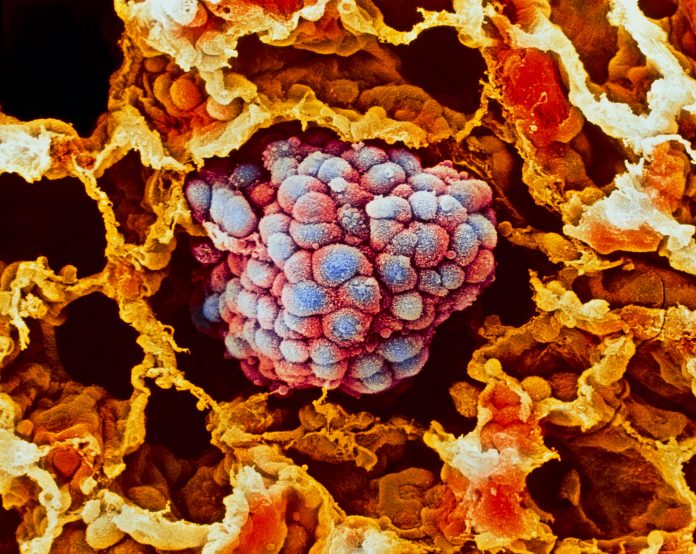
CD70 is highly expressed on drug-resistant cancer cells in EGFR-mutant non-small cell lung cancer (NSCLC) representing a promising new target for treatment of cancer cells that remain after a patient receives EGFR tyrosine kinase inhibitor (TKI) therapy. The new research from investigators at The University of Texas MD Anderson Cancer Center was published recently in the journal Cancer Cell and has implication not only for NSCLC, but range of other cancer types.
“Residual cancer cells left over from TKI treatment are essentially a reservoir from which future resistant cells eventually grow,” said John Heymach, M.D., Ph.D., chair of Thoracic/Head and Neck Medical Oncology at MD Anderson. “These findings set the stage for a really promising approach in which we may give initial effective therapies and immediately follow them with these CD70-targeting drugs to eliminate the remaining residual cells.”
CD70 is a cell surface protein that is usually found on immune cells, but is also shown to be highly expressed in resistant cells after treatment with a TKI. The MD Anderson researchers, led by Monique Nilsson, Ph.D., showed in laboratory models that CD70 can be effectively sued to help target those cells with either an antibody drug conjugate or cell therapies.
One way cancer cells become resistant to EGFR TKIs is via the epithelial-to-mesenchymal transition (EMT). Once tumor cells have undergone EMT, they typically become resistant to most of the available medication used to treat NSCLC. The leads to disease relapse and poor prognosis and represents a large unmet medical need.
The MD Anderson researchers were conducting an analysis of surface proteins in NSCLC cells that had were resistant to treatment and identified CD70 as both overexpressed and upregulated on these cells. This finding suggested that increased cell surface CD70 occurs early in the development of drug resistance.
“It was really encouraging to discover that CD70 was upregulated at such an early point in the evolution of drug resistance because it means we can target these cells quickly without needing to wait for them to develop full resistance,” noted Nilsson.
Once researchers established this relationship, the team them sought to use CD70 as a target for number of different treatment types including anti-CD70 ADCs, CD70-targeting CAR T cells, and CARNK cells. All showed good anti-tumor activity in eliminating the drug-resistant cells in laboratory models.
While their work focused on NSCLC, the MD Anderson investigators noted that this potential treatment approach could be used against other EGFR-mutant subtypes in other cancers such as ovarian, breast, pancreatic, kidney, and melanoma.
“We believe that the lessons we’ve learned from EGFR inhibitor resistance may be more broadly applicable, extending beyond these mutations and possibly applying to other tumor types that eventually develop EMT or other types of treatment resistance mechanisms,” Heymach said.
Next steps for the researchers could be to apply CD70-based therapeutic regimens that are currently in clinical studies against these other cancers in a clinical setting.













